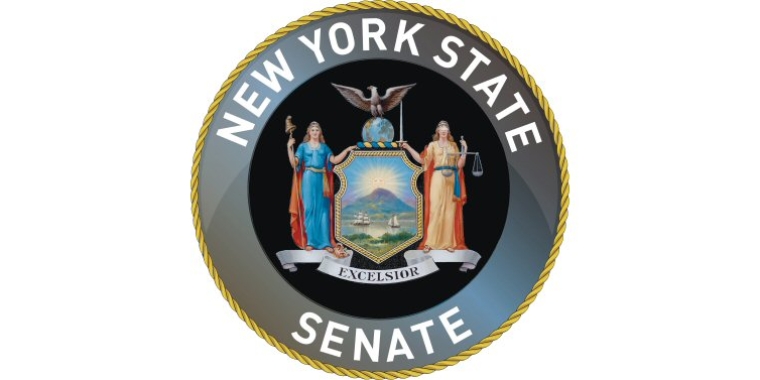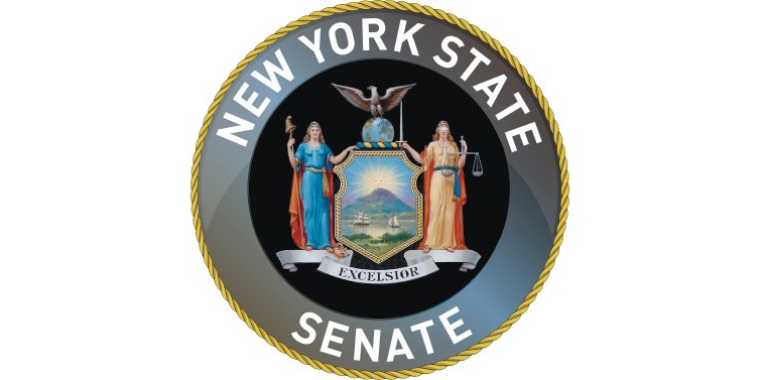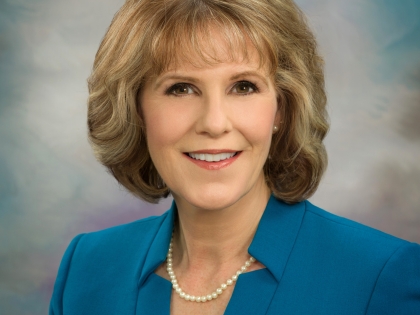
Senator Young Announces A $1 Million Grant to Help Establish the Bio-Refinery Commercialization Center at Alfred State College
Catharine Young
September 17, 2015
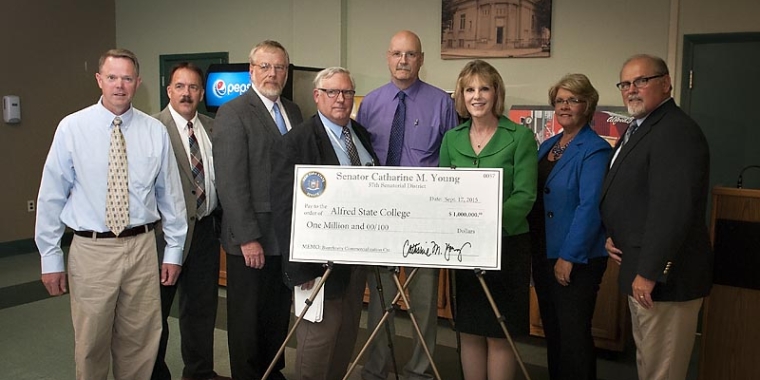
Funding is an important first step in the development of the New Forest Economy project
WELLSVILLE – Senator Catharine Young (R,C,I-57th District) today announced she has secured $1 million to jumpstart the establishment of a Bio-refinery Commercialization Center at Alfred State College that will create jobs and opportunities by using a revolutionary scientific process to extract useful chemicals from wood.
“The best economic strategy is to capitalize on your strengths – what makes your area special. You only have to look around to soak in the awesome abundance of natural resources in the Southern Tier, especially the trees and rolling farmlands that dominate our landscape. For hundreds of years, those forests and fields have provided economic sustenance to our people. Now, it’s time to take those resources to a new level,” Senator Young said.
She said the forest products industry already pumps $8.8 billion annually into New York’s economy, while agriculture is big business with a $40 billion annual impact statewide, and that the Bio-refinery Commercialization Center has the potential to increase those figures exponentially.
“We are hoping to start a wave of transformation across rural New York to renew the upstate economy, especially in forested regions where the economy is struggling,” she said.
Senator Young has championed the endeavor since she was visited a couple of years ago by researchers from the SUNY College of Environmental Science and Forestry (ESF) to pitch their vision of using their science to revitalize rural New York, especially in areas that have an abundance of hardwood forests and farmland suitable for growing willow.
Dr. Thomas Amidon, Bio-refinery Research Institute director, and Preston Gilbert, SUNY Presidential Fellow for the New Forest Economy and assistant director for Community Development, have developed a Hot Water Extraction (HWE) process on cellulose material in a laboratory at SUNY ESF.
The process extracts useful chemicals from natural products, including low value timber and willow. The chemicals can be used for various industrial products and the remaining cellulose material can be used for pellets and products used in structures.
Fuels such as ethanol, butanol, methanol and algal biodiesels from the fermented sugars generated in the process are produced through the environmentally-friendly, cutting edge technique.
Preston Gilbert, a Senior Researcher at SUNY Alfred State College, described the HWE process as “cutting edge.”
“The BDCC will put Alfred State on the fore-front of green energy in the Southern Tier and nationally,” said Mr. Gilbert.
The ESF researchers have teamed up with Alfred State’s School of Applied Technology and Senator Young to establish the Bio-refinery Development and Commercialization Center at the Wellsville campus to further advance research of the HWE process and take the current successful HWE process to a commercial level.
The bio-refinery would be an anchor to develop an integrated cluster of businesses and industries that would rely on products that are produced at the bio-refinery, growing jobs and economic opportunities in the Southern Tier.
The Center will be designed to enable private firms to scale the production of bio-renewable materials and sustainable energy from lab-bench to commercial volumes. It will offer public and private entities access to shared infrastructure and services including material handling equipment, large reaction vessels, and the heat and power load to drive down chemical costs and process bottlenecks that can hinder companies’ abilities to bring products to market. The university will gain a unique educational opportunity for students to get hands-on learning alongside industry, according to Alfred State College officials.
“I cannot think of any better partner to achieve these goals than Alfred State College, and I thank them for their leadership in seeing the enormous potential in this endeavor. Alfred State students and faculty will be involved in developing and building the Bio-refinery Development and Commercialization Center using students in Welding, Machine Tool, Drafting/CAD, Mechanical Engineering Technology, Electrical Engineering Technology and Electrical Trades. It will give our students valuable experience to enhance their education and become part of a highly-skilled workforce,” she said.
Dr. Amidon said, “This project is essential to expedite the commercializing of the technology and then building commercial facilities in Cattaraugus and Allegany counties. Those facilities, and other to be subsequently built around New York and the United States, will need highly skilled employees, and Alfred State is moving quickly to be the best place to educate them. This partnership with ESF leading the ongoing research, Applied Bio-refinery Sciences leading the commercialization, and Alfred State leading the skilled education component has coalesced under the leadership of Senator Young. This leadership is critical to move the HWE technology quickly to the step of creating permanent commercial operations with high paying skilled jobs based on the abundant and sustainable forest and agricultural resources in the Southern Tier.”
Dr. Skip Sullivan, the President of Alfred State College, said, “We are grateful for the support of Senator Young and the State of New York in helping us to establish the Bio-refinery Development and Commercialization Center on our School of Applied Technology campus in Wellsville. This facility will complement our new Advanced Manufacturing Center, and will also prepare our students for careers in the newly developed New Forest Economy and various other industrial facilities.”
Dr. Craig Clark, Executive Director and Dean of the School of Applied Technology at Alfred State College, said, “This funding for the BDCC will assure that the college can develop this great economic development project, showcasing the workforce development and the learn-by-doing technology focus of Alfred State College. The ability to have students intimately involved in this manufacturing facility on campus, on a daily basis, will greatly enhance the education of our students.”
Senator Young said that local officials are enthusiastically supporting the Center, and both Allegany and Cattaraugus Counties have contributed $75,000 as seed money so that Seneca Trails RC&D can help quarterback the project.
Curt Crandall, Chairman, Allegany County Board of Legislators, said, “Allegany County is grateful for the assistance we have received from Senator Young regarding the Bio-refinery Development and Commercialization Center. When completed this project will not only benefit Wellsville and Allegany County, it will also benefit the entire Western New York region and beyond. The New Forest Economy utilizes our natural resources in ways that they have not been tapped before. We are excited about this project and look forward to the jobs and economic development it will create.”
Crystal Abers, Director of Economic Development, Planning and Tourism for Cattaraugus County said, “Cattaraugus County appreciates being involved in the Planning Stages for this tremendous opportunity for the Southern Tier. I am excited about Phase II of the New Forest Economy initiative. We are looking forward to providing possible sites for a new manufacturing facility in Cattaraugus County. I applaud the SUNY schools for taking the lead on this fabulous project and great opportunity for new job growth. This initiative is the much needed shot in the arm for the Southern Tier. We have an abundance of natural resources. The New Forest Economy initiative provides a wealth of opportunities for our land owners well into the future.”
Patrick McGlew, Executive Director of Seneca Trail Resource Conservation and Development Council, Inc. (RC&D), introduced the concept of the New Forest Economy in Western New York after learning of it from Dr. Amidon. He echoed the comments of others, adding “There are a number of significant opportunities for our region (and beyond) with this technology. With leadership from Senator Young, the growing collaboration between SUNY College of Environmental Science and Forestry, Alfred State College, Cattaraugus and Allegany Counties, and Seneca Trail RC&D has been outstanding. All involved are in it for the right reasons; to bring opportunities to the region as a whole.”
“The next step is to gain even greater state support. There is a pending application to the Regional Economic Development Council for more funding, and I will be pushing hard for the support of Governor Cuomo and Empire State Development. Here’s a real, live opportunity to revitalize struggling areas of the state,” she said.
Video from the announcement can be found at: https://www.youtube.com/watch?v=afqT9sCD1-o&feature=youtu.be.
Share this Article or Press Release
Newsroom
Go to NewsroomStatement from NYS Senator Catharine M. Young (R,C,I-57th District)
February 28, 2019
Town of Mansfield Slated to Receive $300,000 State Grant
February 27, 2019
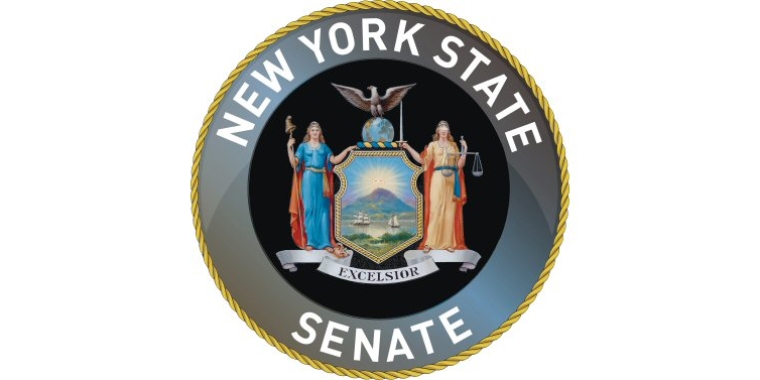
Senator Young Secures $125,000 for Town of Ripley
February 27, 2019
